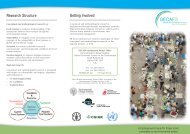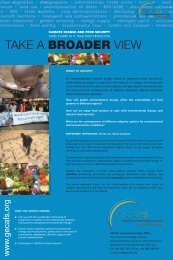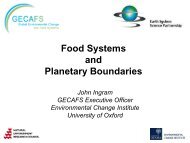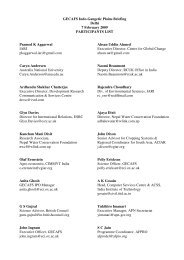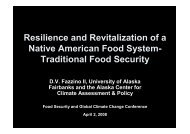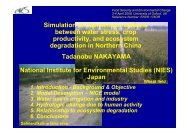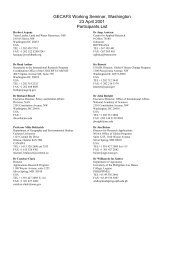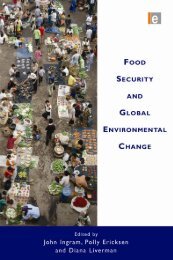Improving input-use efficiency across the whole food systemThe food system approach discussed in this thesis helps identify where input-use efficiencycan be increased. Regarding the ‘food producing’ activity, future intensification (includingthe use of improved germplasm via genetic modification), must seek <strong>to</strong> increase theefficiency of use of added inputs while minimising adverse effects on the environment. Thisis especially necessary so as <strong>to</strong> minimise the contribution of producing food <strong>to</strong> crossing the‘planetary boundaries’ (Paper 3), and innovative production methods will need <strong>to</strong> bedeveloped.Gregory et al. (2002) noted the need <strong>to</strong> reduce the loss of nutrients from fertilisers andmanures, and increasing the efficiency of water utilisation in crop production, but pointed outthese were challenging objectives. The need <strong>to</strong> improve the efficiency of inputs inagricultural systems is still well recognised and research necessarily continues <strong>to</strong> be focussedon these goals. Main attention is targeted <strong>to</strong>wards nitrogen (e.g. Hirel et al., 2007; Ahrens etal., 2010), water (e.g. Hsiao et al., 2007; Blum, 2009) and energy (e.g. Nassiri and Singh,2009). Other necessary research avenues involve better coupling of plant and animalcomponents in agricultural systems <strong>to</strong> optimise input use efficiency.The need <strong>to</strong> increase the efficiency with which we translate scientific knowledge <strong>to</strong> thefarmer and other resource managers is also well recognised, but it is beset withmethodological challenges; how do we define knowledge; how do we engender better‘uptake’; how do we measure success? Given the massive investment in agricultural science,work on ‘knowledge-use-efficiency’ warrants a major effort. Falling largely in the socialsciences, this would add great value <strong>to</strong> what is currently a biophysically-dominated agenda.There is also a need <strong>to</strong> understand how <strong>to</strong> increase input use efficiency across other areas ofthe food system. The use of energy and water needs <strong>to</strong> be optimised in transport and s<strong>to</strong>rage(especially in the cold chain); in food processing; in retail; and in consumption. Paper 3details many of the environmental impacts associated with the full food system but perhapsthe most pressing need is <strong>to</strong> reduce waste.Waste occurs in all food system activities. In food production, estimates range from 8-22% ofcereals wasted at farm-level and post-harvest due <strong>to</strong> poor s<strong>to</strong>rage (Bala et al., 2010), <strong>to</strong> nearly100% in some situations for horticultural produce (Parfitt et al., 2010), although this isusually termed post-harvest ‘loss’. Over 40% of marine fisheries is wasted as by-catch(Davies et al., 2009).Parfitt et al. (2010) also note seven other stages in the whole food system where food iswasted, not least post-purchase. They estimate that 25% of food purchased (by weight) iscurrently wasted per year in UK households, up from 1-3% immediately pre-Second WorldWar. Given the economic, environmental and ethical costs this waste must be reduced, andresearch is urgently needed on how <strong>to</strong> improve consumer perceptions and attitudes <strong>to</strong> waste,118
especially given the power now vested in the major food retailers (Grievink, 2003;Schilpzand et al., 2010).Reducing waste across the whole food system will increase the amount of food available forhuman consumption for the given level of inputs, thereby improving input use efficiency.Enhancing food system governanceAs Brown and Funk (2008) point out, “Transform agricultural systems through improvedseed, fertilizer, land use, and governance, and food security may be attained by all”. Theauthors thus draw attention <strong>to</strong> the need for enhanced governance in the food producingactivity, but in fact this applies both within and between all activities in the food system; poorgovernance anywhere in the food system (be it related <strong>to</strong> political, economic or socialaspects) is often a major fac<strong>to</strong>r contributing <strong>to</strong> food insecurity.The inherent cross-level and cross-scale nature of 21st Century food systems means theyinvolve multiple ac<strong>to</strong>rs and stakeholders. This is due, in part, <strong>to</strong> the globalization of foodsystems, the increasing power of large private sec<strong>to</strong>r companies and new roles of NGOs in,for example, organics and certification. Related <strong>to</strong> this, one of the most significant recenttrends in food systems is the increasing importance of private sec<strong>to</strong>r and non-governmentalac<strong>to</strong>rs in governance – the formal and informal rules, institutions and practices that guide themanagement of food within a complex network of governments, organizations and citizens(Biermann, 2007). As Schilpzand et al. (2010) note, this shift in governance <strong>to</strong>wards nonstateac<strong>to</strong>rs has been “deeply shaped by several broad trends associated with recent patternsin economic globalization”. They identify five major drivers including: (i) the diminishingregula<strong>to</strong>ry authority of nation-states and the tendency for them <strong>to</strong> shift in<strong>to</strong> facilitative roles;(ii) conversely the growing authority and ‘regula<strong>to</strong>ry’ role of large corporations, particularlythrough supply chain management and private contracting, which is also often described as‘private rulemaking’; (iii) the spread of corporate social responsibility (CSR) doctrine andpractices, as well as an explosion of public-private or social-private alliances; (iv) a parallelgrowth in the role of NGOs at all levels of governance; and (v) the emergence of globalnetworks as a key cross-cutting organizational form, and the way in which global supplychains have become the focus of regula<strong>to</strong>ry efforts.<strong>Food</strong> system governance is hence highly complex, further complicated by differingunderstanding of scales and levels and a range of governance approaches. Termeer et al.(2010) address the need <strong>to</strong> “disentangle” governance complexity by identifying three types ofgovernance: ‘monocentric’ (the dominating formal structures), ‘multilevel’ (many examplesemerging) and ‘adaptive’ (relatively new and less experience). They note that adaptivegovernance has the “ambitious goal of developing new governance concepts that can handlethe inherent complexity and unpredictability of dynamic social-ecological systems”. It maytherefore be the most appropriate for food security research as it accommodates the complexinteractions between social and ecological systems. More importantly, however, adaptive119
- Page 1 and 2:
From Food Production to Food Securi
- Page 3 and 4:
From Food Production to Food Securi
- Page 5 and 6:
Table of ContentsAbstract .........
- Page 7 and 8:
Paper 6: Undertaking Research at th
- Page 9:
AbstractFood security is a conditio
- Page 12 and 13:
2010 about 925 million people had t
- Page 14 and 15:
water) are used, and reduce negativ
- Page 16 and 17:
While the flow of the argument abou
- Page 18 and 19:
determine interactions along and be
- Page 20 and 21:
Paper 3: A Food Systems Approach to
- Page 23:
From Food Production to Food Securi
- Page 26 and 27:
concerns and are now issues that mu
- Page 28 and 29:
the relationships between GEC and f
- Page 30 and 31:
Theme 2 aims to understand how comm
- Page 32 and 33:
GEC and the Food System of the Indo
- Page 34 and 35:
Paper 2: The role of agronomic rese
- Page 36 and 37:
These advances have resulted from a
- Page 38 and 39:
Crop selection to determine mechani
- Page 40 and 41:
Agronomic science is central to imp
- Page 42 and 43:
Agronomic research in relation to f
- Page 44 and 45:
The discussion above identifies a n
- Page 46 and 47:
interventions and political inertia
- Page 48 and 49:
While research on producing food ha
- Page 50 and 51:
Box 1 Food system Activities and fo
- Page 52 and 53:
In addition to broadening the debat
- Page 54 and 55:
options. Examples already seen rang
- Page 56 and 57:
Figure 3 Outcomes for 10 variables
- Page 58 and 59:
Figure 4 Nine ‘planetary boundari
- Page 60 and 61:
Figure 5 Environmental change, food
- Page 62 and 63:
Table 1: Indicative analysis of the
- Page 65:
From Food Production to Food Securi
- Page 68 and 69:
Trade Agreement (NAFTA) and the Eur
- Page 70 and 71:
Parry et al., 2005). Conducting foo
- Page 72 and 73:
is provided in the ESF/COST Forward
- Page 74 and 75:
Paper 5: Engaging Stakeholders at t
- Page 76 and 77:
into actions (strategies, policies,
- Page 78 and 79: Box 2 Engaging with stakeholders in
- Page 80 and 81: Box 3 Setting the research agenda f
- Page 82 and 83: Third, and of considerable practica
- Page 84 and 85: Figure 2: Organizing and understand
- Page 86 and 87: organizations made up of numerous n
- Page 88 and 89: Elements of good practice in stakeh
- Page 90 and 91: Finally, it is worth noting that fo
- Page 92 and 93: development (Lee, 1999; Gunderson a
- Page 94 and 95: Box 7 The GECAFS stakeholder survey
- Page 96 and 97: ‘break down’ what might be a hi
- Page 98 and 99: Paper 6: Undertaking Research at th
- Page 100 and 101: agriculture in many parts of the wo
- Page 102 and 103: gaps. The presence of a strong tech
- Page 104 and 105: an average of two years to coalesce
- Page 106 and 107: Institute for Meteorology and Hydro
- Page 108 and 109: Identifying case study sitesResearc
- Page 110 and 111: can both benefit from and contribut
- Page 112 and 113: Box 5 Mapping stakeholder interests
- Page 114 and 115: Holding planning meetings in locati
- Page 116 and 117: This reorientation of the debate fr
- Page 118 and 119: Importance of this type of research
- Page 120 and 121: Integrating the food system concept
- Page 122 and 123: awareness of the GEC issues within
- Page 124 and 125: pollutants were then introduced as
- Page 126 and 127: communities operating in food syste
- Page 130 and 131: governance focuses on the range of
- Page 132 and 133: Developing research agendas in supp
- Page 134 and 135: The renewed approach to interdiscip
- Page 136 and 137: BIELAK, A., HOLMES, J., SAVGÅRD, J
- Page 138 and 139: EAKIN, H. 2010. What is Vulnerable?
- Page 140 and 141: GODFRAY, H. C. J., BEDDINGTON, J. R
- Page 142 and 143: INGRAM, J. S. I. & FERNANDES, E. C.
- Page 144 and 145: LYUTSE, S. 2010. The One Billion To
- Page 146 and 147: RAYNER, S. & MALONE, E. L. 1998. Hu
- Page 148 and 149: UNDP 2006. The 2006 Human Developme
- Page 150 and 151: activities “from plough to plate
- Page 152 and 153: contribution to the science agenda:
- Page 154 and 155: urgently needed, and - given the gr
- Page 156 and 157: GECAFS plannenmakerij stelde vast d
- Page 158 and 159: ieder hun eigen groep van betrokken
- Page 160 and 161: het gebied van beheer hebben betrek
- Page 162: Curriculum VitaeFollowing a BSc in



